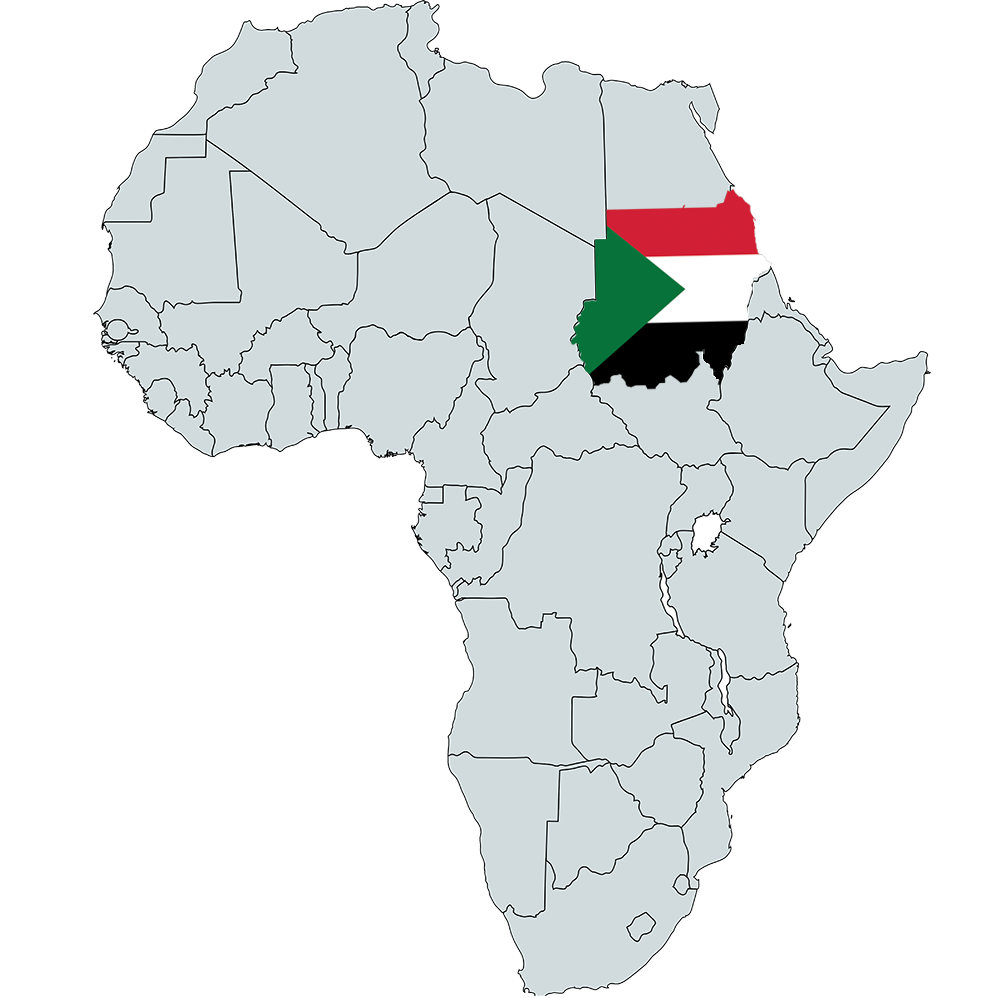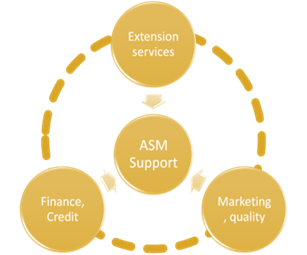
Sudan ASM Profile Political Economy & Strategic Standpoints | Social and Environmental Factors | Local linkages | ASM Sites in Sudan
Sudan’s mining industry is vastly dominated by oil production with petroleum being one of the biggest contributors to the economy accounting for 10% of the GDP in 2010. Sudan’s mineral potential remains vastly untapped. The secession of South Sudan brought about disparity in both the countries’ economies. Three-quarters of the oil reserves being in South Sudan, North Sudan had to diversify and recently started promoting its gold mining sector. According to the Ministry of Minerals gold export represent 9% of total exports in 2010 and ASM operations contribute to an estimated 85% of the total national production. Despite the adverse circumstances, the government is working towards upgrading its mining sector.
In 2013, gold exports decreased to 24,813 kilograms (kg) from 46,133 kg in 2012. Total production for 2014 was estimated at 70 tones making Sudan the 3rd largest producers on the African continent. It is estimated that around 1 million to 1.5 million people are engaged in ASM. In 2012, artisanal miners in the Jebel Amir District in North Darfur State produced about 14,000 kg of gold. In January and February 2013, hostilities between tribal warlords over control of the mines resulted in more than 400 deaths. The major ASM sites are located along the River Nile, Northern state, N0rth Kordofan, and Southern Kordofan. Data on ASM is sparse due to a variety of factors such as the activity’s intermittent nature, mobility of miners and the geographically spread nature of the activity.
There are no official estimates of the number of women taking part in ASM, estimates are around 10% to 30% of the direct an indirect workforce. There are more opportunities for women as they are already empowered on the political level and hold leadership positions at country level.
Country Mining Vision Status
Yet to be Initiated.
Policies, Laws and Regulations Currently in Effect
The Mines and Minerals Development Act, 2015
The Mineral Wealth and Mining Resources Development Act 2015
The Regulation of Traditional Gold Mining (2012)
ASM Associations or Cooperatives
I. SCOOP: South Sudan Cooperative
ASM Definition Criterion
Nationality; Mechanization; Nature of mineral; Area size;
ASM Licensing
Artisanal: YES
Small Scale Mining: YES
ASM Minerals or Metals Exploited
Precious Metals Gold, Silver
Base Metals Iron ore, Chrome, zinc, lead, copper, Nickel, Tin
Minerals Asbestos, Manganese, Marble, Gypsum, Mica , Uranium, Kaolin, Cobalt, granite
Precious Stones Diamond
Development Minerals Manganese, Fluorite,
ASM SUPPORT TRIANGLE

Mining Code Provisions for Women in ASM
Mines and Mineral Act 2015, Part II Administration (6.4)
The Minister shall, where practicable ensure equitable gender representation when appointing the members of the Committee*.
* “Committee” means the Mining Licensing Committee
Mineral Policy of Sudan:
Issue: lack of incentives and investment in the mining industry
Policy Objective: Recoup the revenue loss following the secession from South Sudan by prioritizing and expanding the mining sector, particularly the gold sector
Policy Statements:
I. The Government will boost the minerals production and productivity;
II. The Government will increase state revenue mobilisation from gold mining from the two groups of gold miners (Mining companies and artisanal miners);
III. The Government will diversify production of mineral commodities;
IV. The government will promote investment and add value to minerals.
Mining Policy Environment:
No significant additional laws or regulations for mining legislation were enacted until 1990 when the government introduced the Investment Encouragement Act of 1999. Since 2005 mining policies have received more attention. The mining policy is now giving greater incentives to the private sector especially for gold mining. The country suffered from economic sanction for a period of time and struggles to attract foreign investors.
The new policy caters to ASM, health and safety related issues along with environmental degradation, Illicit Financial Flows (IFFS) and smuggling of gold. Sudan along with the other laws and regulations around mining is committed to international conventions relevant to ASM sub-sector: Minimata Convention on Mercury, Basel Convention on Control of Tras-boundary Movements of Hazardous Wastes and Their Disposal (1989), ILO Convention of Worst Forms of Child Labor (1999), Rotterdam Convention on environmental concerns, Bamako Convention on the environment. However due to the dispersion of ASM on the Sudanese territory monitoring and enactment of laws and conventions is challenging.
Finance and credit
There is ongoing support to ASM with trade-microcredit access and special taxation plans. Different micro-crediting options are available to miners through various NGOs. The Savings Bank and Industrial Development Bank in Edmazin and other State capitals offer opportunities for micro-crediting small scale enterprises, which are accessible to the ASM community. In addition, new development oriented banks in rural areas are providing credit for startup projects.
Extension services - a phased approach to integration and capacity-building
Under the national strategy to eradicate mercury in the mining process, the Government is introducing mercury-free machines for use in ASM. Pilot gold production sites were created in the Bayuda Desert, the River Nile State in the north where practical demonstrations on gold extraction and technologies use were performed. Training included ore handling, sluicing (wet and dry), ore concentration, amalgamation and retorting. Nurse trainers were also acquainted with gold mining and processing settings, and the inherent environmental and health risks entailed (UNIDO, 2007).
Marketing and quality
The government opened the Sudan Gold Refinery and initially banned the export of gold ore from Sudan by private companies, this significantly reduces the amount of gold smuggled outside of Sudan. The refinery also processes silver.

